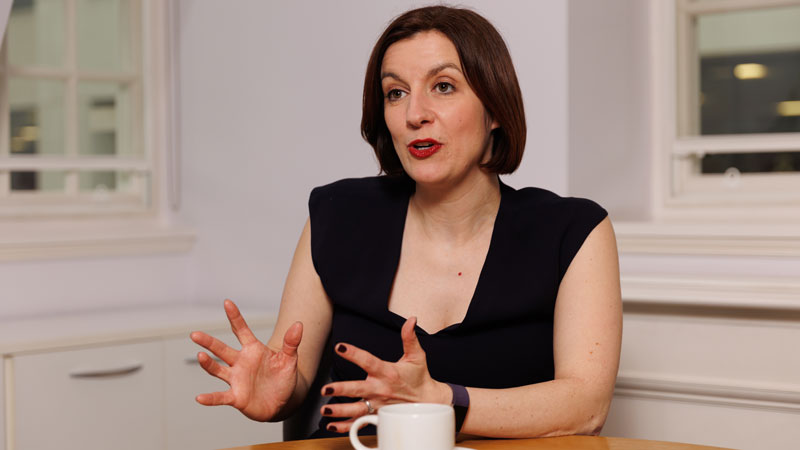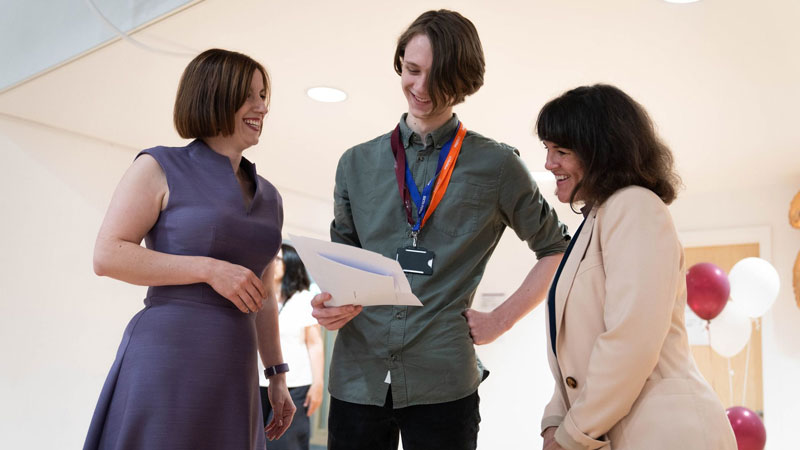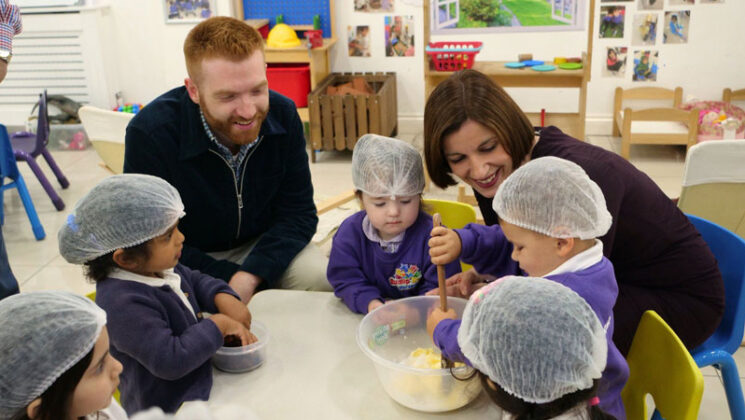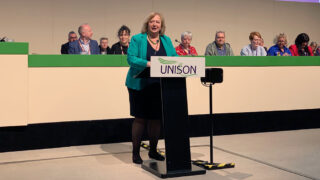Bridget Phillipson was born into Thatcherism and brought up by her mother, a single parent, in a council house with dodgy heating in Washington, a former mining town in Sunderland. While times could be hard, there was no lack of inspiration – from her mum, her maternal grandparents and from her teachers.
“I do feel that I was very lucky in many ways,” she recalls now. “It wasn’t easy, we didn’t always have a great deal of money. But I had a supportive and loving family, who really valued education, and drummed into me at a young age the importance of reading and being at school and the wider role that communities can play in supporting one another, which is something that has stayed with me.
“We always had books in the house. My granddad would be picking up second-hand books at markets and, increasingly, charity shops – autobiographies, history, fiction, just something that caught his eye, something unusual.”
Her mother, Clare Phillipson, established the Wearside Women in Need charity in the early Eighties, which offered refuge for the victims of domestic violence. And alongside a love of learning, came an an early interest in community, and politics.
“Both my mum’s parents were nurses. So they were always interested in what was going on in the health service and in the world. My mum’s a Labour Party member. And she was a single parent – so if she wanted to go to these meetings, then I had to go to these meetings, because there wasn’t really that much by way of childcare in those days.”
She attended Catholic school, “where we were all encouraged and supported, and were valued as individuals.” One of the deputy heads, Mr Hurst, was particularly tenacious in encouraging her to apply to Oxford University. “Everyone can remember the teacher or the member of school staff who helped them during their life,” she says. “And that’s so powerful.”
As Labour’s shadow education secretary, Ms Phillipson looks back to those formative people and events. “What that taught me was not that family is unimportant, but that, actually, government can support families and can make a huge difference as to whether children can thrive.” Of course, when Ms Phillipson says ‘can’, she also means ‘should’.
Class ceiling

You know, I think i’ve got the best job in the shadow cabinet… I would just like to take the shadow out of the job title
No doubt encouraged by that early exposure to Labour with her mother, the young Bridget became a member herself at 15. After graduating, she returned to the north east, working briefly in local government before joining Wearside Women in Need, helping to run one of its new refuges, built with money from the then Labour government. Still precocious, she was elected MP for Houghton and Sunderland at the 2010 general election, aged just 26.
She served briefly as shadow chief secretary to the Treasury, before Keir Starmer gave her education in November 2021. It seems like a particularly auspicious match of politician and post. Did she lobby for it?
“I know Keir well, and I’d like to think he imagined it to be a good fit, in terms of my interests and passions,” she says. “You know, I think I’ve got the best job in the shadow cabinet. I would just like the opportunity to be in a position to make change happen, from government, to take the shadow out of the job title.
“Education is such an amazing way in which we can open up opportunities for children and young people, but also for adults, giving people the opportunity to train, to upskill, throughout their working lives.”
Her portfolio is central to Labour’s ambition to break the class ceiling for working people – the barriers to opportunity that include inaccessible or unaffordable childcare and early learning, a staff retention crisis, and lack of high-quality pathways onto apprenticeships and technical education.
Ms Phillipson has identified some key initiatives, a number accompanied by concrete sources of funding. These include:
- Recruiting 6,500 more teachers
- Introducing free breakfast clubs in every primary school in England
- Providing mental health support staff in every secondary school
- Reviewing early years and childcare provision
- Bringing back the school support staff negotiating body (SSSNB)
The teachers and mental health support will be paid for by ending the current tax breaks for private schools, the breakfast clubs, at a cost of £365m a year, by the new taxation of non-doms – the mega rich whose tax loopholes have just been targeted by chancellor Jeremy Hunt, one instance where Labour won’t mind having its idea stolen.
Breakfast clubs
“We’re seeing a widening of the gap between the more affluent, and the more disadvantaged children within our society,” says Ms Phillipson. “I want to narrow that gap when it comes to their time at school and what they can achieve.
“Breakfast clubs are about making sure that children arrive at school ready to learn. It’s a softer start to the day. They’ve had breakfast. They get time with their friends, time for other activities before the school day starts properly; and I think that’s important, especially after the pandemic, where lots of children spent time apart from their friends and missed out on some big experiences.
“It’s also about how we deliver high standards in our schools, because all of the evidence points to how breakfast clubs drive improvements around attendance, outcomes, behaviour.
“And it’s important for parents too, allowing them to have more choice in terms of work commitments, their working hours. I’ve heard from parents who say if they could get to work even half an hour earlier, that would make a big difference, to whether they could move into a different role or take on extra responsibility, if that’s what they want in order to progress their careers.”
Childcare
For Ms Phillipson, the breakfast clubs represent “the first step towards a modernised childcare system, from the end of parental leave to the end of primary school”. But the full realisation of that ambition is a longer-term project.
“Childcare has largely been left to the market to deliver. The chancellor announced in the budget last year a pledge around childcare, but no plan to make it happen. And in lots of communities across the country, the places aren’t there. He created a theoretical entitlement for parents, but one that parents are already finding is not going to exist in reality.”
Labour has engaged Sir David Bell, the former chief inspector of Ofsted, to carry out an early years review. “He was the permanent secretary at the Department of Education, and a primary school teacher, where he started his career, so he’s got a wealth of experience.
“We’ve asked him to look at how we deliver the childcare that parents need across the country, how we make sure we’ve got a properly supported workforce, who are given opportunities to develop their careers, and a better link between early years education and childcare. Because at the moment, we’ve got a very fragmented system.”

There is an opportunity here to think creatively
There was a time when more primary schools had nursery schools attached, or nursery classes within the school. And, she says, “There is an opportunity here to think creatively, not least because we’re facing a falling birth rate, and primary schools will pretty soon end up with surplus classrooms.”
Many UNISON members still rue the end of Sure Start. Ms Phillipson says the evidence is clearer than ever of the “impact and effectiveness” of the Labour initiative, but there are lessons to be learned from the Conservatives’ ability to enter government and close the centres down wholesale – though that won’t mean Sure Start, per se, will be coming back.
“We can’t just turn back the clock. But we do need to get to a position where we have better coordination of services that are supporting families.” The key could be structural, “to embed more of what goes on in early years into the education system, so that it’s seen as an established part of it, not an add-on.”
Raac
Another issue that defies a quick fix is Raac, the dangerously crumbly concrete that led last year to the closing of dozens of schools. Ms Phillipson suggests this is just the tip of the iceberg, as many schools are “riddled with asbestos” and too much money is being spent “patching up schools that are past their design life” given there hasn’t been a proper school rebuilding programme during the Tory reign.
Labour’s first priority would, necessarily, be one of investigation, “to get to the bottom” of the full extent of the Raac problem. “In the meantime, the government should get on with making some progress. The fact that we’re in a in a general election year is neither here nor there, because children and staff deserve decent schools.”
A seat at the table

Support staff have got a critical role to play in our schools and right across our education system
Much of what Ms Phillipson wants to achieve in schools will need support staff on board, whether it’s delivering the breakfast clubs, or teaching assistants providing the extra help Labour wants to offer children around speech and language skills.
“Support staff have got a critical role to play in our schools and right across our education system,” she says, while acknowledging the need to “deliver” for the workers themselves. One way of doing that, and a Labour pledge if it wins the election, is to restore the School Support Staff Negotiating Body (SSSNB).
UNISON worked with the last Labour government to create the SSSNB, before it was scrapped by then education secretary Michael Gove, shortly after the Conservatives took power in 2010. It would, again, become the negotiating body covering terms and conditions for teaching assistants, caretakers, office staff, technicians, catering staff, cleaners and all other support staff working in schools, many of whom currently sit at the bottom end of local government terms and conditions.
“We’re facing a growing recruitment and retention crisis where it comes to school support staff, as well as teaching staff. I know from speaking to UNISON members that they want to see a real focus on standardising terms and conditions and having good career pathways, opportunities for progression, training and development, as an early priority for the SSSNB.”
And what about pay?
Ms Phillipson’s groundwork has included scouting for lessons and ideas abroad (noting, for example, the “inspiring” childcare reformed by the Labour government in Australia) while, at home, speaking to staff in nurseries, colleges, universities and schools throughout England.
“Right across education, what I hear from staff on the ground is that they don’t feel appreciated for what they’re doing, they don’t feel valued, they don’t feel respected. And some of the rhetoric that we’ve had from government has made that worse,” she reports.
But, standardisation in schools aside, inadequate pay is an enormous issue across the education sector. And UNISON’s members in HE and FE would also wonder how, were the SSSNB to recommend increasing pay, a Labour government would be able to oblige.
Shadow chancellor Rachel Reeves told the BBC recently that a Labour government would inherit the worst economy since the Second War War and would “not be able to turn things around straight away” if elected.
“I mean, the economy’s in a terrible state,” Ms Phillipson concurs. “But there are immediate changes that we will make, if we win, that will start to make a big impact.
“The SSSNB will give UNISON members a voice once more at the highest levels of government. That will not solve every problem overnight, but it will be a big shift from where we are with this current government, who seem to enjoy stoking industrial tensions, rather than finding ways to resolve things. It’s a starting point from which we can build further.”
A regional perspective
Ms Phillipson says she has a strong ally in the would-be occupant of No 11. “I’ve been pushing at an open door with Rachel, because she very much wants to see more investment in education and in our public services.”
As one of those rare, refreshing MPs who represents their home area, she believes that the north east gives her an important, regional perspective, at a time when cost of living is people’s dominant concern.
“Whenever I’m thinking about national policy and its impact, I always think back to the north east and whether it would work there,” she says, “because I think if it works for communities that are facing pretty big challenges in their lives, then chances are it will work everywhere.”
We started our conversation by something in the news that day, namely Ms Phillipson’s announcement that a Labour government would train young male mentors, in schools, to combat the negative impact of online influencers like Andrew Tate. “I’ve always been very passionate about tackling violence against women and girls,” she tells me, which takes us back to her mother’s work and influence.
Ms Phillipson now has two children of her own, Orla, 12, and eight-year-old Gabriel. Does she pick their brains?
“I’m interested in what they tell me,” she says, smiling. “You know, we absolutely have to listen to people working in education, but we also have to listen to children’s experiences, whether they’re happy in school, what they want to see.”
She says that as a 13-year-old, in 1997, she was aware of the changes that Labour brought to education. “Oh, absolutely. And my daughter will be 13 later this year. So there’s a synchronicity there. I hope that, if we win the election, we can start to make some of those changes that made such an impact on my childhood.”
Education is a devolved power, which means that the Westminster government is responsible for England only.
Portrait Images: Ralph Hodgson






A really good article. And in informed and detailed argument for returning Labour to power.